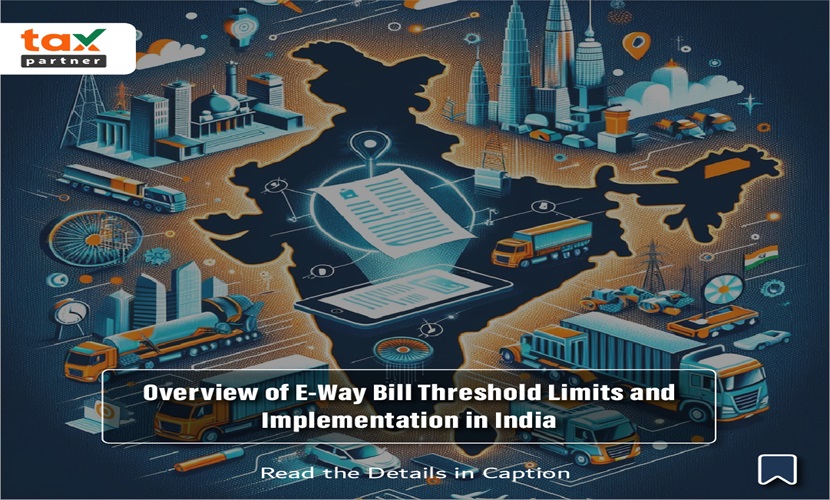Connect with us for all your queries



E-way bill as a provision within the ambit of GST was first introduced on 1st february 2018. Notification No. 12/2018- Central Tax, dated March 7, 2018 made E-way Bill mandatory for interstate transportation of Goods exceeding Rs.50000, the mode of transportation of these goods could be either road,railways,airways and vessels. Similarly later vide Notification No 15/2018–Central Tax dated March 23, 2018 it was declared that E-way bill will be mandatory even for intrastate movement of Goods and its applicability was left on the states which is why the appointed dates varies between states.
Under the CGST rules the limit of Rs.50,000 was applied upon the interstate movement of goods and states were given the power to decide the threshold limit of intrastate movement of Goods which they started implementing in 2018 onwards.
|
|||||||||||||||||||||||||||||||||||||||||||||||||||||||||||||||||||||||||||||||||||||||||||||||||||||||||||||||||||||||||||||||||||||||||||||||||||||||||||||||||||||||||||||||||||||||||||||||||||||||||||||||||||||||||||||||||||||||||||||||||||||||||||||||||||||||||||||||||||||||||||||||||||||
Scope of movements of goods decides the difference between an interstate and an intrastate E-way Bills
|
Other than geographical difference and scopes of transportation both interstate and intrastate e-way bills serve similar purposes, which is documenting the movement of goods from one place to other for compliance and regulatory purposes.
Although E-Way Bill is too be issued for the transportation of all taxable goods above the permitted limit, but there are certain category of Goods which are exempted wide notification issued under the central tax rate notifications. Underneath mentioned is the list of certain exempted goods.
|
Liquefied petroleum gas intended for household use and customers exempt from non-domestic categories |
Kerosene distributed through the Public Distribution System (PDS) |
Mail handled by the Department of Posts |
Pearls (both natural and cultured), gemstones, precious metals, and items plated with precious metals |
Jewellery, wares produced by goldsmiths and silversmiths, and similar articles |
|
Currency |
Personal and household items that have been used |
Coral, both in its natural form and when processed |
The transportation also covers alcoholic beverages for human consumption, crude oil, high-speed diesel, gasoline, natural gas, and aviation turbine fuel. |
Goods in transit that are classified under Schedule III of the Act, which includes transactions not considered as a supply of goods or services (such as employment services provided by an employee to their employer, duties performed by Members of Parliament, etc.). |
|
Empty cargo containers |
Goods other than de-oiled cake, detailed in the Central Tax (Rate) notification No. 2/2017, dated 28th June 2017, which includes: |
Dairy products like curd, lassi, and buttermilk |
Unprocessed and fresh milk without any added sugars |
Fresh vegetables and fruits |
|
Fresh vegetables and fruits |
Raw tea leaves and coffee beans that haven't been roasted |
Live animals, plants, and trees |
Meat (unprocessed) |
Cereals |
|
Unbranded rice and wheat flour |
Salt |
Educational materials such as books, maps, and periodicals |
|
|
Only these 19 types of things listed below need an e-way bill to move within the state of Gujarat.
|
In Himachal Pradesh, the e-way bill for movement of goods within the State of Himachal Pradesh is required only for following 17 types of goods
|
In Madhya Pradesh, the e-way bill for movement of goods within the State is required only for following 10 types of goods
|
Tax Partner is India’s most reliable online business service platform, dedicated to helping you in starting, growing, & flourishing your business with our wide array of expert services at a very affordable cost.